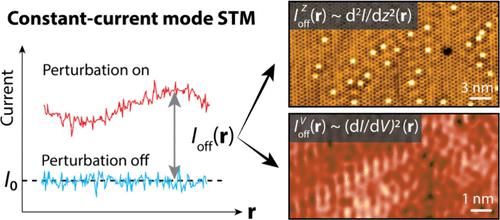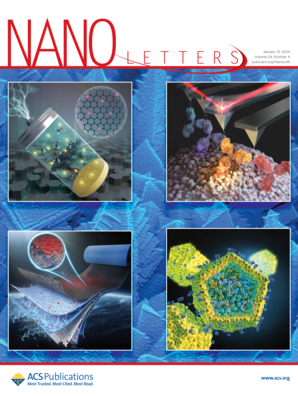Deriving Material Properties from Feedback Error Signals in Scanning Tunneling Microscopy
IF 9.6
1区 材料科学
Q1 CHEMISTRY, MULTIDISCIPLINARY
引用次数: 0
Abstract
Imperfections in measurements, e.g., deviations and broadening, are not devoid of information; rather, they can reveal valuable physical properties and processes. Scanning tunneling microscopy leverages a negative feedback loop to regulate the tunneling current. Practically, current fluctuates around its set point, and such deviations are considered insignificant and ignored. Here, we investigate the information embedded in these deviations. In the constant-current mode with an active feedback loop, we observe an unexpected persistent DC current offset from its set point when the tunneling junction is periodically perturbed. We demonstrate both experimentally and theoretically that such error signals encode local tunneling barrier heights and the square of local differential conductance as a consequence of the interplay between rectification and active feedback compensation. We provide evidence on the generalizability of this phenomenology to other negative feedback systems. This new approach has the potential to broadly impact physical sciences by allowing rapid measurements without lock-in amplifiers.

求助全文
约1分钟内获得全文
求助全文
来源期刊

Nano Letters
工程技术-材料科学:综合
CiteScore
16.80
自引率
2.80%
发文量
1182
审稿时长
1.4 months
期刊介绍:
Nano Letters serves as a dynamic platform for promptly disseminating original results in fundamental, applied, and emerging research across all facets of nanoscience and nanotechnology. A pivotal criterion for inclusion within Nano Letters is the convergence of at least two different areas or disciplines, ensuring a rich interdisciplinary scope. The journal is dedicated to fostering exploration in diverse areas, including:
- Experimental and theoretical findings on physical, chemical, and biological phenomena at the nanoscale
- Synthesis, characterization, and processing of organic, inorganic, polymer, and hybrid nanomaterials through physical, chemical, and biological methodologies
- Modeling and simulation of synthetic, assembly, and interaction processes
- Realization of integrated nanostructures and nano-engineered devices exhibiting advanced performance
- Applications of nanoscale materials in living and environmental systems
Nano Letters is committed to advancing and showcasing groundbreaking research that intersects various domains, fostering innovation and collaboration in the ever-evolving field of nanoscience and nanotechnology.
 求助内容:
求助内容: 应助结果提醒方式:
应助结果提醒方式:


